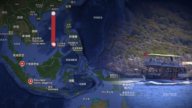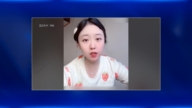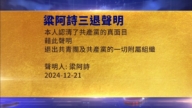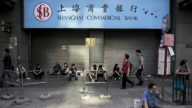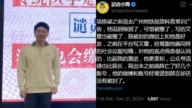【新唐人2012年7月10日訊】《中國青年報》最近刊登評論文章,直接指出:本應在報導和輿論中,起到中流砥柱作用的黨報黨刊,大報大刊,總是在關鍵時刻啞火。文章說,傳統媒體假裝看不見,並不會真的讓公眾看不見,僅僅是將傳播權和主導權白白出讓了。分析指出,這說明很多新聞人對中共當局長期嚴控輿論相當不滿,終於在報紙上有所表露。
《中國青年報》4號刊登了一篇「有些事,無法假裝看不見」的評論員文章,內容說,近期經常發生一種怪現象,有些事情,網路上議論紛紛,微博有圖、有細節,有當事人訴說、有旁觀者描述,可傳統媒體竟不見半句報導,紙媒無字,電視無影,廣播無聲。
文章還說,傳統媒體假裝看不見,並不會讓公眾看不見,僅僅只是將傳播權和主導權白白出讓了,結果只會將問題越捂越大,甚至導致問題失控。
原《河北人民廣播電臺》編輯朱欣欣指出,這篇評論文章等於把平時大家都想說的話,挑明瞭,說出了一些有良知的新聞人內心的不滿。
原《河北人民廣播電臺》編輯朱欣欣:「說明很多很多的官方媒體的新聞人相當不滿了,終於在報紙上有所表露,也說明了最近為甚麼有一些人,再次呼籲要制定新聞法呢,也是反映了很多很多人的心聲。」
上世紀80年代,中共當局就批准成立了新聞法起草小組,但新聞立法至今懸而未決。
朱欣欣指出,中共元老陳雲曾經坦承,以前中共曾利用國民黨的新聞法攻擊國民黨,如果一旦有了新聞法,就不方便控制媒體了。
朱欣欣:「如果有一個稍微的所謂的違背了它們的權力的規定,有些媒體不是受到整肅,要不就是一些人員受到處理,所以它不敢制定新聞法,它就不能把這個寫進去,它如果寫進去了呢,它就在全世界人面前,在整個中國人面前,暴露出它獨裁專制這麼一個體制的本質。」
《中國青年報》的文章還表示,常有人抱怨傳統媒體被新興網路媒體搶了風頭,昔日黨報媒體、大報大刊日益被邊緣化為非主流。傳統媒體不見新聞,這表面上看是傳統媒體失去話語權,其實,真正失去話語權的是政府部門。
網路作家荊楚指出,中共的傳統媒體實質上是中共的發聲筒,它的功能就是欺騙民眾。
荊楚:「喉舌媒體有個基本的定律,就是西方國家、文明國家發生的芝麻那麼大的壞事,它要變成西瓜那麼大,人家發生西瓜那麼大的好事,它要變成芝麻那麼大,或者根本不理,對於國內它是反其道而行之。這樣子久而久之它就有了一個輿論導向,就對國人進行了欺騙和蒙弊。」
荊楚表示,久而久之,民眾再也不相信傳統媒體,這也是因此中共當局公信力和官方喉舌媒體信譽掃地的一種體現。
荊楚:「現在可以說官方的媒體都被網民唾棄了,根本就不相信它了,你像全國發生甚麼事情,它要新華社統一發稿,就是全國都統一一個口徑,不讓你不同的聲音存在,只允許一種黨八股,假、大、空的聲音存在。」
美國國務院公布的2011年人權報告指稱,中國是獨裁國家,中國的人權情況持續惡化,特別是言論、集會與結社自由方面。
朱欣欣:「一切社會問題,它需要用輿論,用新聞的媒體把它先暴露出來,你才能解決問題,如果捂著蓋著,像駝鳥一樣假裝看不見這些問題,這個社會越來越危險,所以說,在未來中國的改革,必須先從開放言論,開放黨禁、報禁從這方面入手。」
朱欣欣指出,網路媒體的蓬勃發展,中共想控制輿論的時代已成過去式,與其被動的控制網路,倒不如順應民心,放開輿論,讓中國的新聞媒體和輿論環境邁入民主國家的行列。
採訪編輯/李韻 後製/李月
Chinese Media Admit Traditional Media
Are Marginalized by Internet
China Youth Daily recently published an article stating
that Chinese Communist Party (CCP) key media always keeps silent at critical times.
The article points out that traditional media pretending
not to know the facts does not really blind people.
It only gives an opportunity for other media to report.
Commentators point out that many media professionals
are not satisfied with the CCP’s long-term control.
It finally reveals their attitudes on the newspaper.
China Youth Daily published a commentator’s article entitled
Some Matters Cannot Be Ignored by Pretending Not To See.
It states that a strange phenomenon has occurred recently.
When some incidents are reported on the internet, such as
microblogging, with eyewitness pictures and narration,
there is nothing reported by the traditional media,
such as newspaper, television or radio.
The article also states that traditional media pretending
not to see what is happening will not blind people.
It only gives other the opportunity to report.
The more they want to cover things up, the more serious
the issues will become, and can even go beyond control.
Former Hebei Broadcasting Station editor Zhu Xinxin points
out that this article talks about what people want to say.
It highlights the desertification of those
media professionals with conscience.
Zhu Xinxin: “It shows many official media professionals
are very unhappy, and finally express it in the newspaper.
It shows why recently some people once again are calling
for media laws, which reflects what people want.”
In the 1980’s, the CCP authorities approved a team to draft
media laws, but these law have never been finalized.
Zhu Xinxin points out that former CCP senior official,
Chen Yun, once admitted that in the past,
the CCP used the Kuomintang’s new media laws
to attack the Kuomintang.
It will not be convenient to control
media once there is a law.
Zhu Xinxin: “If someone violates the CCP’s rules,
they will be disciplined and punished.
The CCP doesn’t dare to have media laws.
It doesn’t want to document anything, as this will expose
the authorities’ totalitarian nature in front of the whole world.”
An article from People’s Daily also stated that people who
complain about traditional media are marginalized on the internet.
It seems that traditional media has lost its control,
but in fact, it is the government that has lost its control.
Internet writer Jing Chu points out that CCP traditional
media is its mouthpiece that it uses to mislead people.
Jing Chu: “Mouthpiece media has a rule to expand tiny
negative incidents that happen in the West into major events.
It shrinks major positive events in the West into tiny events.
It also does the opposite for things in China.
It misleads people in China.”
Jin Chu comments that people do not believe in traditional
media, and the authorities and its media have lost credibility.
Jing Chu: “Official media have been abandoned
by people, and no one believes in them.
Whenever something happens, Xinhua News Agency will
have the standard report to share with all other official media.
Only party’s voice is allowed.”
The U.S. Department of States Report on Human Rights
Practices for 2011 indicates that China is a dictatorship.
The human rights situation in China continues to deteriorate,
especially in the aspect of freedoms of speech and to gather.
Zhu Xinxin: “All social problems need to be exposed
by media, so that they can be resolved.
If they are covered up, they will become more dangerous.
Future reform in China must start by stopping media control.”
Zhu Xinxin said internet media has developed very fast,
and that the CCP cannot control it anymore.
The CCP should follow people’s wishes to open up media,
and allow the media environment in China to be like that in democratic countries.




